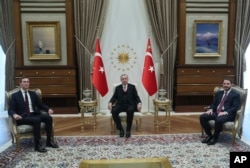White House adviser Jared Kushner and Turkish President Recep Tayyip Erdogan discussed the Trump administration's Israeli-Palestinian peace plan at a meeting Wednesday in Ankara.
Kushner has special responsibility for Israeli-Palestine policy and is touring the region to build support for what he reportedly calls "the deal of the century.”
Erdogan is a critical player in the region because of his strong backing of the Palestinian cause and Hamas.
Hamas is working closely with Ankara, says international relations professor Huseyin Bagci of Ankara’s Middle East Technical University.
“Under Erdogan, Turkey supported Hamas from the very beginning financially,” he added, “Turkey supported Hamas in every conflict with Israel. Erdogan is critical of U.S. policy (toward the Palestinians), and the rhetoric will remain very critical.”
Erdogan was in the forefront of condemning U.S. President Donald Trump’s recognition of Jerusalem as the capital of Israel. The Turkish president called an emergency summit of the Organization of Islamic Conference in Istanbul to condemn Trump’s move and rally support for the Palestinians.
Analysts suggest Erdogan could prove to be more flexible to Kushner’s efforts than his rhetoric suggests.
"It will depend on what the Israeli and American side offers to Turkey,” said Bagci, “technically, Turkey is on the side of the Palestinians. If Turkey is to play a role (in supporting the peace plan), then there will have to be concessions from Israel and America.”
Kushner’s Ankara visit comes amid broader strained bilateral relations. In January, Erdogan snubbed Trump’s national security advisor John Bolton, refusing to meet him during his visit to Ankara. Instead, Erdogan chose to deliver a speech to parliament sharply criticizing Bolton.
Ankara blames Trump's ministers and advisers rather than the president himself for the current tensions. Despite ongoing pressures, Erdogan continues to describe his relationship with Trump as positive.
Analysts say Kushner, being Trump's son-in-law, offers an inside track to Erdogan.
“We can call it the second-track diplomacy,” said Bagci. “If they (Erdogan and Trump) don’t trust those around them, they use their sons-in-law if the presidents can't meet. It's always been like this here. It's nothing new in the region.”
Erdogan’s son-in-law, economy tsar Berat Albayrak, also attended Kushner’s meeting with Erdogan. The U.S.-educated Albayrak is believed to have built a strong working relationship with Kushner that reportedly saw them arrange the last meeting between the U.S. and Turkish presidents.
No official statement was released after Kushner’s three-hour meeting with Erdogan. However, bilateral issues were also reportedly discussed, including Syria.
Erdogan is demanding the creation of a 30-kilometer-deep safe zone in Syria to protect the Turkish frontier from the YPG Kurdish militia, deemed as terrorists by Ankara.
"What is important to us is that Turkey will control the secure zone," Erdogan said on Tuesday. "We cannot leave the control to Germany or France or America. I clearly told this to them.”
Trump initially proposed the secure zone as a means to ease Ankara's security concerns, but also to protect the YPG from Turkish attack.
The Kurdish militia is a crucial ally in America’s war against the Islamic State. U.S. military support of the YPG has soured ties, with Ankara accusing Washington of allying itself with terrorists.
Erdogan Tuesday called U.S. generals' commitment to recover weapons given to the YPG as “insincere.” Such mistrust, analysts say, is compounded with lack of clarity of White House policy over Syria
“The Turks will expect their counterparts to make more concrete proposals (on safe zones) so that the two sides can engage in negotiations involving alternative plans,” wrote columnist Burhanettin Duran in the Daily Sabah. Duran also heads SETA, a Turkish research group with close ties to the government.
While Turkish forces continue to mass on the Syrian border, analysts suggest it remains unlikely Ankara will act unilaterally in Syria. Erdogan claimed he would probably meet with Trump in April. The timing of the meeting is an issue believed to have been raised by Erdogan during his talks with Kushner.
Turkey’s imminent purchase of Russia’s S-400 missile system, analysts say, is likely to have been on the agenda of Kushner’s talks. The missiles are due to be delivered later this year in the face of warnings of sanctions by Washington. The White House claims the missiles pose a security threat to NATO weapon systems.
Erdogan on Tuesday again reiterated the missile sale would “definitely” be completed. With missile deliveries slated to begin as early as July, time is limited for the NATO partners to avoid a crisis. However, given lack of trust between the sides, analysts say, Erdogan will be looking for a face-to-face meeting with Trump to find a compromise.

